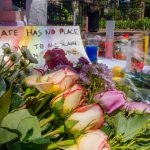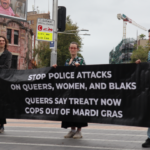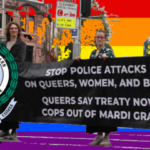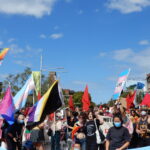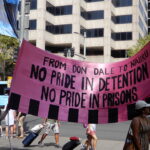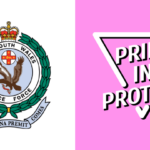Sydney’s LGBTIQA+ Community Is Demanding Cops Out of Mardi Gras
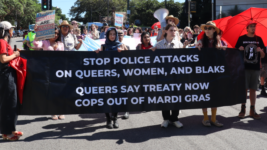
The Pride in Protest Mardi Gras Street rally 2025 gathered at Pride Square in Newtown prior to marching on Gadigal up King Street towards Camperdown’s City Park, where the annual Mardi Gras Fair Day festival was underway and as has been a key demand of this movement since it sprung up in 2018, demonstrators were calling for cops to refrain from marching in the Mardi Gras parade.
This long-term gripe came to a head last year, as then serving NSW police senior constable Beau Lamarre-Condon murdered two gay men using his service pistol right before last year’s event, which traumatised the community and left many deeming it the final straw in respect of the ongoing demand that NSW police withdraw its presence from the Mardi Gras parade.
The Mardi Gras board then took the unprecedented step last year of requesting NSW police not march in the parade to allow the community “space to grieve”, but both the NSW premier and the Australian prime minister would not have it, and with their pressure being applied, police officers marched in the parade wearing plain dark blue clothes, yet still flanked by uniformed officers.
For those gathered at Pride Square last Sunday afternoon there is nothing controversial in asserting that law enforcement shouldn’t be involved in the event, as the NSW Police Force is known to be a notorious nest of homophobes, transphobes, racists and misogynists that’s historically dealt out prejudice, violence and neglect when it comes to the queer community.
As the Pride in Protest procession made its way up Newtown’s King Street last Sunday, the messaging on the banner that preceded it – “Stop Police Attacks on Queers, Women and Blaks” – was as valid today as it was for the original 1978 march, and the raising of such attacks gave clear reason as to the crowd not wanting the boys and girls in blue parading alongside them.
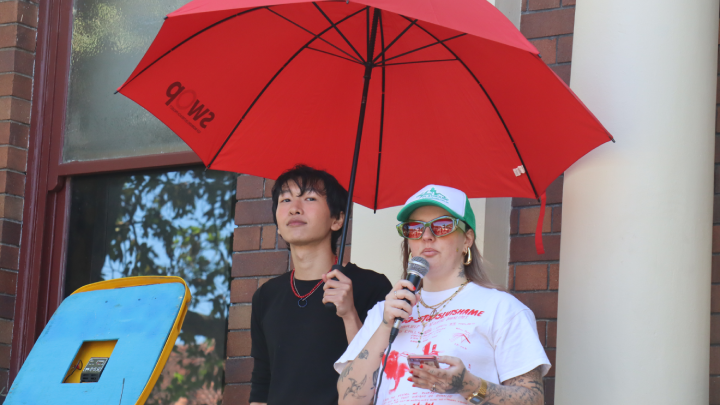
Not appropriate at Mardi Gras
“Last year, we were here because a cop murdered two community members, and they were still allowed to have a float at Mardi Gras,” SWOP (Sex Worker Outreach Project) policy officer Soss told the crowd in Pride Square. “Police continuously fail to respond appropriately when marginalised people are harmed, leaving perpetrators to continue offending.”
“The culture of avoidance and nonaccountability in the police force has serious implications for marginalised communities, and it has particularly devastating consequences for those who experience intersectional marginalisation,” she continued, and went on to explain that the type of prejudice the police serve to the LGBTIQA+ community is akin to that the force provides sex workers.
Soss recalled that on hearing of the violence NSW police officers were subjecting the marchers to in the first Mardi Gras back in 1978, sex workers left their corners and their brothels to join marchers and defend their community. Indeed, on that first night, police officers surrounded demonstrators and then violently set upon them to arrest 53 participants.
Gay and trans hate crimes were rife in the Greater Sydney region from the 1970s onwards into early this century, and the neglect and lack of concern shown to these uncountable assaults and dozens of murders by the NSW Police Force was notorious.
NSW police commissioner Karen Webb apologised for the 40-odd years of gay hate crime neglect in February last year, just days prior to the discovery of the bodies of the men Lamarre-Condon had gunned down.
“Sex workers have a deep understanding of why cops are not appropriate at Mardi Gras,” Soss made clear. “Their involvement in the parade has pushed so many sex workers to feel like we should revoke our representation in queer celebrations.”
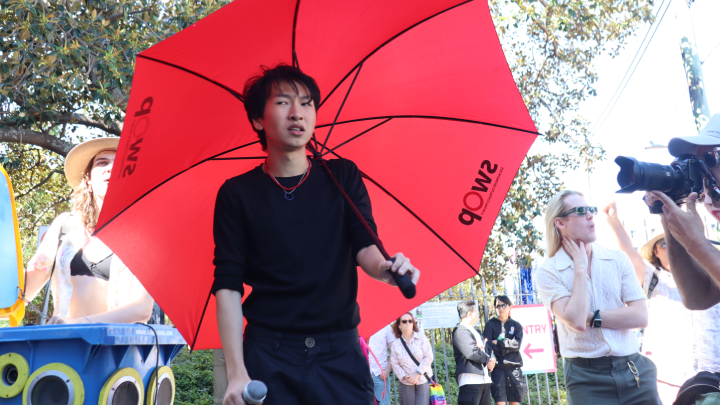
The radical roots of Mardi Gras
Mardi Gras board member Damien Nguyen, who ran on the Pride in Protest ticket for the election last year, told Sydney Criminal Lawyers right before the 7 December Mardi Gras annual general meeting, that the “most contentious” motions his group and the board itself were raising called for cops out of the parade.
“We have been consistent in our politics around no cops at pride. The police are bigoted, and they are a racist organisation that continues to harm our community,” Nguyen said in late November.
The removal of law enforcement, conservative politicians and certain corporate entities from the parade has been the approach Pride in Protest has taken to Mardi Gras, since it began agitating in 2018. And since then, there has been a distinct shift in these positions from being marginal concerns to front and centre issues.
Three motions to have NSW police participation removed or minimalised in the parade were narrowly voted down at last December’s Mardi Gras AGM, while the 2023 AGM saw members vote to end the Mardi Gras Police Accord that had allowed members of the force to conduct “decency checks” of community members who were about to march in the parade, amongst other things.
“They should not march in the parade, because being in the parade allows them the social licence to continue to be homophobic and transphobic towards members of our community every other day,” underscored Nguyen, the Mardi Gras board member candidate that took out the most primary votes at last year’s election.
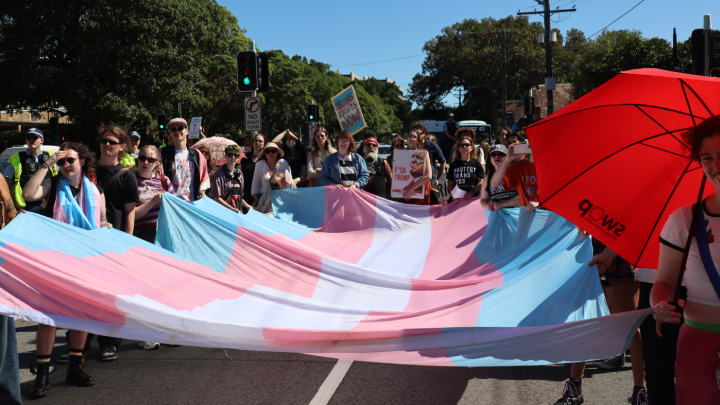
A time of declining rights
As the Pride in Protest demonstration made its way up King on 16 February, across the lower end of the banner at the front of the march was the message, “Cops Out of Mardi Gras”. But this was not the only concern on the day. Other key issues involved sex worker antidiscrimination protections and the recent detaining of Asian migrant trans women at Villawood immigration centre.
Of course, the coming of US president Donald Trump and his reversal of the rights of transgender people was too a key concern, and Community Action for Rainbow Rights (CARR) spokesperson April warned marchers that the developments in the US would impact here and she called for a local movement to organise in solidarity with queer people in the States.
“I don’t have any animosity to individual police. I love the police to be there to serve me when I need them. But that is not the innate nature of the police. The police are there to defend the state and to defend big business and to defend the law,” said Ken Davis, a 78er (participant in the first Mardi Gras parade).
“The legal situation right now is not good, particularly in regard to protests. It is not good in terms of free speech. It is not good in terms of the police being an agent of class oppression. It’s not good in terms of police racism, in how they treat women or in how they treat us,” the 78er made certain.
“So, the problem is the institution of the police. So, yes, it is okay if individual police are marching as public sector workers with rights. But if they are advertising their employer, that makes me feel sick.”


